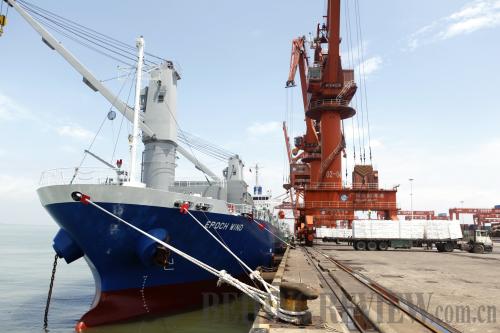Free trade for the future
- By Bai Shi
 0 Comment(s)
0 Comment(s) Print
Print E-mail Beijing Review, November 2, 2014
E-mail Beijing Review, November 2, 2014
|
|
|
Pulp imported from Indonesia is unloaded in Qinzhou, south China's Guangxi Zhuang Autonomous Region, on May 28, before being processed into paper products that will be sold around the world [Wang Shen] |
On the 25th anniversary of the founding of the Asia-Pacific Economic Cooperation (APEC), China's capital city Beijing will host the 22nd annual APEC Economic Leaders' Meeting (AELM) on November 10-11 with the theme Shaping the future through Asia-Pacific partnership. The meeting and other related events combined are known as the 2014 APEC Economic Leaders' Week.
The AELM first came to China in 2001 when the meeting was held in the booming economic and business hub of Shanghai. At that time, China, though firmly on the fast lane of economic growth, was not yet a member of the World Trade Organization (WTO) until it was admitted a month later at the Fourth Ministerial Meeting of the WTO on November 10, 2001 in Doha, Qatar.
That ninth AELM in Shanghai achieved success, as APEC leaders reached consensus on many issues. For example, APEC adopted the Shanghai Accord and issued its first Counter-Terrorism Statement following the attacks on the United States on September 11, 2001.
China has undergone huge changes in the last 13 years. It has become the world's second largest economy and an important trading partner for the rest of the world. As the world economy is facing sluggish growth and many uncertain factors, China's role in promoting Asia-Pacific cooperation has caught the attention of regional economies.
Priorities of discussion
The economic leaders' week is the high point for the 2014 APEC China Year, with the APEC community holding great expectations for fruitful results.
At a think-tank forum in Beijing on October 29, Chinese Foreign Minister Wang Yi said that there are over 100 cooperation proposals from all APEC member economies to be put forth at the annual economic leaders' meeting. More than half of the proposals have been proffered by China.






